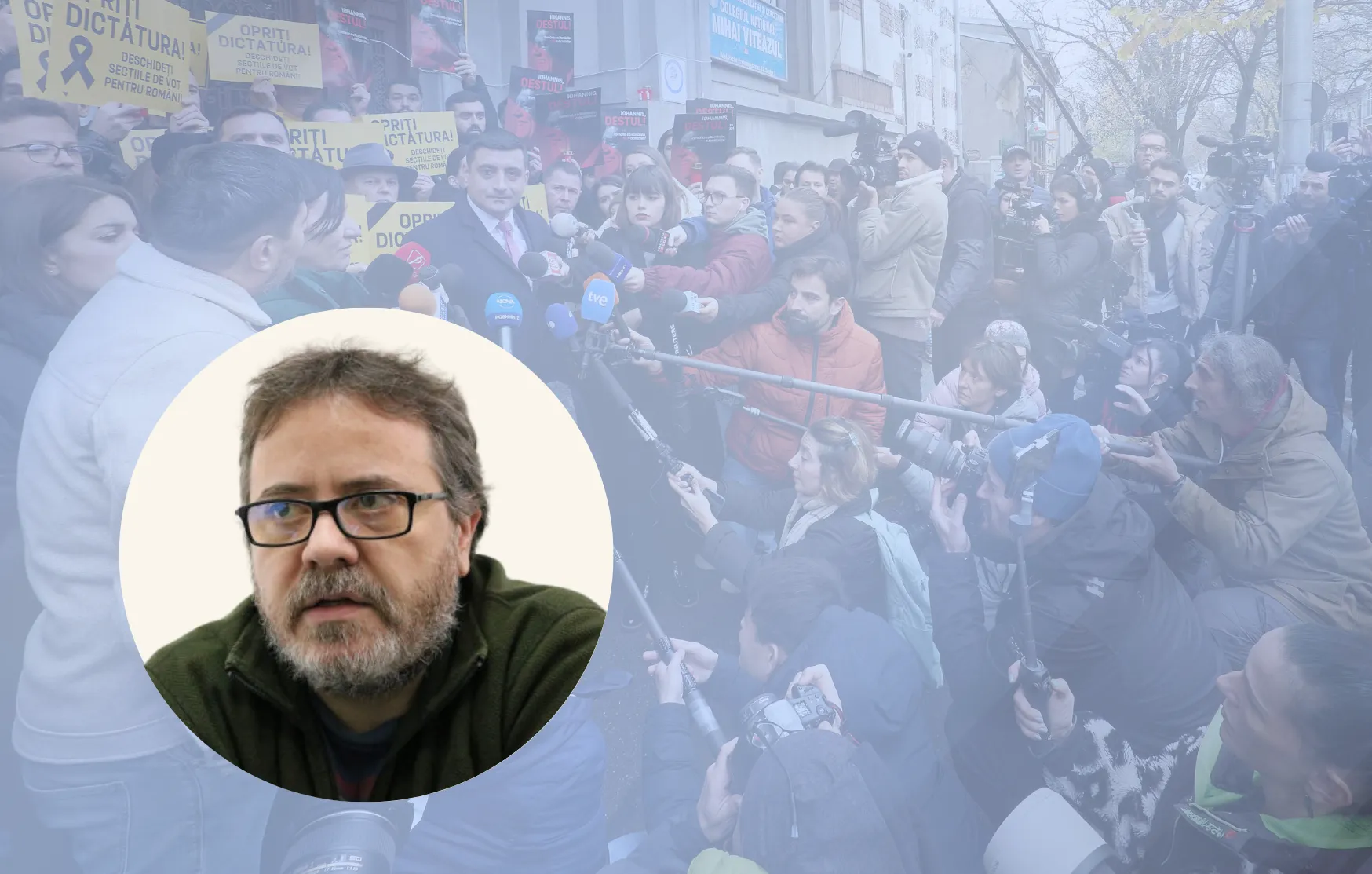Despite court rulings, Romania still risks seeing an extremist as president – leading academic

In December 2024, Romania’s Constitutional Court annulled the first round of the presidential election, held on 24 November, after intelligence reports revealed evidence of cyberattacks and foreign attempts to “influence social cohesion.” The decision was unprecedented in Romania’s history and rarely seen in Europe. Călin Georgescu, the independent candidate who received the most votes in the first round, largely due to a TikTok campaign, has called it an attack on democracy. Mr. Georgescu has publicly praised Romania’s World War II fascist leaders and is seen as holding a pro-Russian position.
Campaigning is now in full swing for a repeat election, with voting for the first round set for 4 May. In March, Romania’s Central Electoral Bureau (BEC) disqualified Mr. Georgescu from standing in the re-run citing violations of electoral law. The BEC also rejected the candidacy of Diana Șoșoacă, SOS Romania party leader, who had already been barred from running in the 2024 presidential election for “anti-democratic and anti-semitic discourse.”
The political crisis unfolding in Romania has affected already low public trust in political institutions and processes. Inspired by LEGITIMULT's research on trust as a fundamental condition for democracy in times of crisis, we interviewed Claudiu Tufis, Associate Professor at the Faculty of Political Science at the University of Bucharest. Tufis teaches topics such as quantitative methodology, civil society, social movements and democratization.
Claudiu Tufis spoke with Emily Bloom, Associate Programme Officer in International IDEA’s Democracy Assessment team, on 17 March 2025.
How would you describe the range of reactions in Romania to the annulment of the presidential election by the Constitutional Court?
I should start by saying that Romania is generally characterized by very low levels of trust in political institutions, especially in the government, the parliament and the political parties. All of this happened in a context of heavy polarization in the population and unhappiness with the performance and the behavior of the mainstream political parties. The share of people lacking trust in the mainstream political parties increased in size due to this political crisis and they now have even fewer reasons to believe in Romanian institutions, to believe in fair elections, and to believe in democracy.
When it comes to people who are, let's say, supporters of democracy and not necessarily angry with the mainstream political parties, I see two types of reactions. First, people regard the two decisions of the Constitutional Court as weakening Romanian democracy, and they are critical of the decision to ban candidates without offering a strong justification and without taking previous steps. Șoșoacă and Georgescu could have been stopped from running in the election by the regular judicial process under legislation in Romania that, for instance, prohibits support for fascist groups. But they did not use these tools that they had at their disposal.
Then there is a second reaction - and this one seems to be the most common in this group of supporters of democracy. They say, even if it was not the most democratic decision, ending up with Călin Georgescu as president would have been terrible for Romania. This group is trying to justify the means by the ends. The result is that now we have this sort of debate within the “democratic” group of supporters, and it's breaking them apart.
In 2023, only 9% of Romanians expressed any degree of satisfaction with the performance of their national government.
Source: Perceptions of Democracy Survey
What factors have shaped citizens’ perceptions of the democratic legitimacy of the measures taken by Romanian institutions following the (annulled) election?
The first problem relates to where the people are getting their information. In the Romanian context, we've had a sort of decline in the independent mass media over time. Romania’s four or five talk show TV stations that discuss politics every day are all pretty much linked to one political party or another, which use the platform to push the narrative of their own political party. This has been a significant problem for Romanian democracy in the last 10 years or so.
We ended up with a mass media system that is highly uncritical of political parties. It's not covering topics that should be covered and it's failing to inform the population. The population is even actively misinformed by the mass media at the request of political parties. Also, Romania somehow managed to be one of the top countries in Europe that is getting their information about what's happening in politics from social media, and especially from TikTok.
Additionally, there was in my opinion a lost opportunity for the mainstream political parties to show that they were able to learn from their mistakes and course correct. Once the Constitutional Court ruled in favour of running the election again, mainstream political parties had the time to demonstrate to the public that they understood the way people voted.
Everything that has happened since November has served to maintain the rage of the critics of the mainstream political parties. Mainstream political parties did not do much that would show these critics that they are being seriously taken into account. I think that they are still angry, and I think that they are still going to vote in significant numbers against the candidates of the mainstream political parties. At this moment, it's not certain that the danger of having an extremist as president has been avoided by these two decisions of the Constitutional Court.
What steps can political actors take in order to strengthen public trust ahead of the May re-run, and also in the longer term?
We know that the only way to increase political trust is by improving institutional performance. Of course, performance is difficult to measure and it takes time for changes to actually be visible. What institutions can do is become more transparent and improve communication with the public about the decisions they make. The Constitutional Court’s decision to bar Șoșoacă included only a six-page motivation. This is the general way Romanian institutions are behaving: a lot of decisions are not explained to the public, they are very opaque, and they are not communicating. Everything is very tightly controlled when it comes to information, and people don't understand why politicians and institutions are taking the decisions that they are taking.
Additionally, I think that some of the people that have been at the center of Romanian politics for a long period of time should take a step back and allow people from the second rank of their own political party to get in front – it’s time for new faces. If you come with the same figures that have been in power for decades, it's clear to everybody that they are not going to change. They haven't changed before, and they have no reason to change now. Of course, it would be better if those new politicians would also be accompanied by new perspectives and positions in the mainstream political parties.
Only a quarter of Romanian respondents believed the 2020 parliamentary election was free and fair
Source: Perceptions of Democracy Survey, Photo credit: Mircea Moira
What can other European governments take away from Romania’s experience in terms of responding to influence operations, given an evolving security landscape?
A widely discussed solution in Romania is ensuring people can learn how to separate information from misinformation. We need to step up education for the public to understand how to analyze the information that they get from various sources, including social networks, and figure out what information is correct. We don't currently have enough of this sort of perspective in Romania. We also need to ensure that interventions are in place to counter misinformation campaigns effectively, allowing for swift action when a TV station, a newspaper or a social network such as TikTok is found to be actively spreading misinformation in the population. I think that's where actual interventions should be made - right at the start of the communication chain. That takes a lot of time. It's not something that you can fix in the short-term.
The other element that I think is important coming from this Romanian case is not to give into quick fixes such as the ones pursued by the Constitutional Court. It's better to take the long way, but the democratic way, of solving a problem rather than arguing that the outcome would be so terrible that we need to behave just as a non-democratic actor would behave. But I hope that that more developed democracies have better institutions and procedures to deal with these kinds of candidates such as Șoșoacă and Georgescu. Normally, as I said, they should have been stopped by the Romanian institutions before the elections, but they just did not do their job.
This interview has been edited for length and clarity.
Opinions expressed in this commentary are those of the authors and do not necessarily represent the institutional position of International IDEA, its Board of Advisers or its Council of Member States.
For monthly-updated information on democracy and human rights developments in 173 countries, visit the Democracy Tracker. For all our data and analysis, visit the Global State of Democracy Initiative.
This blog was produced under LEGITIMULT, a project funded by the European Union under the Horizon Europe Programme, Call HORIZON-CL2-2021-DEMOCRACY-01, GA Nr. 101061550. LEGITIMULT aims to develop a model of legitimate crisis governance that takes into account the multilevel nature of policy-making, namely the interplay between international, national, regional and local governments and institutions.




